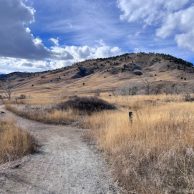
With some deeply chilling temperatures on the near horizon, gardeners can gain a little comfort by fast-forwarding to spring in our minds as we plan for our 2024 gardens. The predictable and unpredictable consequences of climate change call upon us to observe our gardens more closely, revise our expectations of our gardens, broaden our vision of what makes a garden, and make our gardens more resilient and less dependent on uncertain resources.
We have been absorbed in seed catalogs; the past couple of nights my bedtime companion has been has the always-fascinating J.L.Hudson Seed Catalog, which is much more interesting in print than it is online. Our seed orders have been arriving and our propagators have been cleaning our precious wild-collected seeds, applying treatments to break dormancy (mostly hot water, physical scarification, and refrigeration), and making new plants from old by division and cuttings.
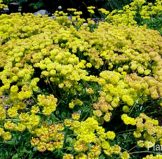
Eriogonum umbellatum var. aureum – Kannah Creek® buckwheat, courtesy Plant Select
Here are some of the seeds I am particularly excited about:
Eriogonum species (Buckwheats):
Most of the buckwheats are Western US natives, and most are adapted to arid conditions. Anyone hiking trails in the foothills of the Rockies or out on the plains will, whether they realize it or not, encounter a number of Eriogonum species. Some are more conspicuous than others and while a few species grow several feet tall, most are low-growing cushions or spreading mats. These offer some of our best options for native ground-cover plants. They have deer-resistant evergreen foliage, and many offer beautiful red or silver color through the fall and winter. They are important nectar sources for butterflies and support lots of other native pollinators. I hope you’re already familiar with Eriogonum umbellatum v aureum ‘Kannah Creek’ which is a beautiful selection discovered in Western Colorado and is, in my opinion, one of the very best Plant Select introductions.
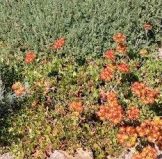
Eriogonum umb. v majus
‘Kannah Creek’s cousin, Eriogonum umbellatum. v majus, is also a Colorado native. We found it growing on a sunny slope near Lower Cataract Lake in Summit County. The population we saw was in bloom, with large flower clusters hovering about 6” above the mats of attractive, rounded green leaves with contrasting white backs. The flowers start out a light cream color and were gradually turning red and pink! And in winter, the ground-hugging foliage turns beautiful, deep red. Although these plants were growing at high elevation and receiving more moisture than we get in Boulder, we’ve grown several specimens in our gardens at home and at the nursery for 4 years, and they’ve prospered in full sun and much drier conditions. We’re stoked to be able to cultivate and offer it!
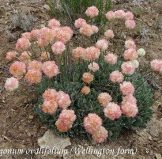
Eriogonum ova. Wellington form, courtesy A. Bradshaw
We also hope to offer, from seed, Eriogonum ovalifolium ‘Wellington form’, a handsome silvery-leafed gem for sunny, Zone 5 xeriscape rockeries, crevice gardens and troughs. This one hails from 5700’ in Carbon County, Utah and makes an attractive woody cushion up to 12” tall and 24” wide with dozens of large flower ‘pompoms’ in multiple colors including cream, yellow, red and pink hovering over the silver-gray foliage. Fingers crossed!
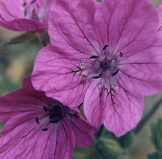
Erodium manescavii, courtesy Wikispecies
I have grown the little-known Erodium manescavii (Manescau Storksbill) in my home garden for about ten years, and it never fails to delight me. But this is the first time we’ve had a good crop of seeds, so I’m excited to offer them. A smaller relative of hardy geranium (Cranesbill), its sprays of 5-petalled, vivid deep violet-pink flowers bloom from spring into autumn over a (usually) evergreen mound of ferny green foliage. Native to limestone slopes in the Pyrenees mountains of France, it seems to thrive in sun or part-shade, likes our alkaline soils, and doesn’t need much water (must be tap-rooted). Honeybees and small native bees visit the flowers. A patch of these foot-tall beauties will stand out in a waterwise garden.
We also expect/hope to offer a number of native Astragalus (Milkvetch) species, including our Colorado native perennial Astragalus crassicarpus, known as Ground Plum for its conspicuous large, fleshy, rosy seed pods that follow pinkish-purple flower spikes of May and June. Native to the plains, high desert and into the mountains, it grows from a thick taproot and fixes nitrogen in the soil.
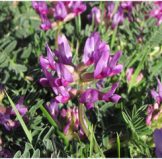
Astragalus crassicarpus, courtesy Lady Bird Johnson Wildflower Center
The fruit is edible and was used by Native Americans as food (though not very palatable) and horse medicine. Ground plums grow in sunny drained soil. The plant is a host of the afranius duskywing butterfly larvae. Like many of our wild native plants, they’re slow to germinate, so may not be ready until later in the season.
There are many other new and fascinating plants we are anxious to see sprouting in our hoophouses, and we’ll provide descriptions to whet your appetite as the winter progresses!
Build Your Skills
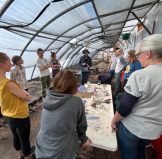
Classes in the greenhouse
Harlequin’s Gardens has the help you need, whether you are starting your first garden or improving an established one. Our mission has always been to offer you gardening success through our superb selection of Colorado-appropriate, healthy, pesticide-free plants grown in real soil mixes that transplant well, and through our effective soil-building amendments, non-toxic pest management products, our expert advice and our tremendous line-up of classes. In our classes this spring (registration opens later this month), learn about:
Succession Planting
Permaculture design
Creating Wildlife Habitat
Water-Wise planting design
Native Plantings
Planting to support pollinators and beneficial insects
Increasing biological diversity to bring natural allies
and many more empowering, practical and inspiring classes to broaden you options and increase your gardening success!
